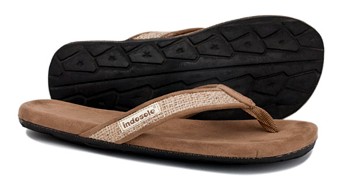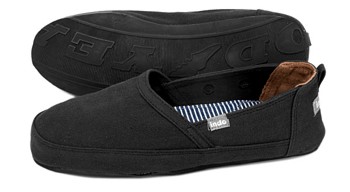Making footwear at Indosole.
Late summer and early fall are some of the best times for shoe fashions because they allow for such a diversity of styles, and always showing your love for the environment with your eco-choices in materials.
Sandals and beach shoes are still great, but you can also start on your fall styles with heaver materials like canvas, suede, and leather – and all made with rubber soles from recycled tires.
Always searching for the best variety of eco-made shoes, I found three fabulous companies – Indosole, soleRebel, and Yellow Port – that are worth taking a look at for their styles and commitments to the environment.
Indosole
Indosole is a fabulous Indonesian company that makes sandals and canvas beach shoes that all look great, and can be worn as part of everyday causal wear.
The materials used include banana leaves, burlaps, canvas, (man-made) vegan suede, and EVA-foam.
 Photo courtesy of Indosole.
Photo courtesy of Indosole.
For those that don’t know much about materials, burlap is a woven fabric from the fibers of the jute plant, combined with other vegetable fibers. Canvas is a heavy-duty woven fabric usually made from cotton, linen (fibers made from the flax plant) or hemp fibers.
Vegan suede is made-made suede, usually made mostly of polyester and without using any animal products. Natural suede is a kind of animal leather.
 Photo courtesy of Indosole.
Photo courtesy of Indosole.
EVA foam, also called ethylene vinyl acetate, has a lot of great qualities including that it’s soft and flexible, as well as really tough, crack resistant, and waterproof.
All of the soles are made from repurposed motorbike tires. The company exclaims that, “Indosole is on a mission to salvage old motorbike tires and other trash from landfills and give them new life.”
Indosole also boasts that its “products are handmade by skilled Balinese artisans and the production process does not contain fuel-powered machines.” The company adds that it “conducts fair trade practices in its workshops.”
soleRebels
soleRebels is another great company devoted to creating shoes that are bright, beautiful, durable, great for the environment, and help build a great life for the local community where they are made in Addis Ababa, Ethiopia.
soleRebel features shoe styles such as the tooToos (slipper shoes), sandals, Slip-Ons (loafers), Lace-Ups (loafers), CoZEEs boots, and urbanRUNNERS (sneakers).
 Photo courtesy of soleRebels.
Photo courtesy of soleRebels.
Bethlehem Tilahun Alemu, founder and managing director of the soleRebels, says on the company’s website that all of the shoes feature recycled car tire soles, and an array of recycled and sustainable materials including “handspun and hand loomed organic fabrics, and a palate of unique natural fibers including organic pure Abyssinian jutes, and pure Abyssinian koba (plant fibers).” SoleRebels also makes shoes using pure Abyssinian leather.
Talking about the materials used at soleRebels, Alemu says “We source our cotton from small scale heritage organic and traditional growers, ensuring you get a wondrously soft cotton, and a historic crop continues to flourish.”
“The art of hand spinning of cotton also dates back millennia here in Ethiopia, and our artisans are among the finest. Interweaving our handspun cotton with colorful accents, we hand-loom every single meter of fabric that makes up our unique shoes using traditional eucalyptus looms that have been used here in Ethiopia for centuries,” she adds.
 Photo courtesy of soleRebels.
Photo courtesy of soleRebels.
In using jute fibers, Alemu explains that for centuries Ethiopians have been shipping coffees around the world in hand-woven Abyssinian jute bags, which she describes as “strong, durable and very comfortable plant fibers that we grow right here.”
Koba fibers, which are also used for shoe fabrics, are from an indigenous plant that has been cultivated in Ethiopia for over 10,000 years, according to Alemu, who describes it as “a marvel of efficiency, every part of the koba plant has a use: its roots provide in times of food shortage; it is self-regenerating once harvested, requires little water to grow, and no chemical inputs. That’s why we call it the freedom tree and the tree of hope.”
In making leather for shoes, Alemu explains that, “Ethiopia is home to the largest population of livestock in Africa, with at least 40 million people owning livestock. The sector is crucially important in reducing poverty, where a large percentage of the population is directly affected by the leather industry.”
Alemu continued that, “There are no animal factories here, only the loving tradition of small-scale free range animal raising, where animals freely roam and graze, tended by their owners. It’s the same tradition that’s endured here for millennia and proudly survives until this day. This is what we mean when we say AbyssinianPure.”
Alemu is also proud of the quality of life that soleRebel has provided for its employees and the local economy.
“Based on the approach we are taking to footwear creation, that being hand crafted and eco-sensible, we source and make almost all our materials locally, thereby creating an export product from 100 percent local inputs.,” says Alemu.
“We committed ourselves to not only creating jobs for our fellow citizens, but excellent paying ones that are far and above what other local employers are paying for similar work. Our average workers earn a full four to five times the legal minimum wage and over three times the industry average. Many workers earn much more. In addition, we are helping to preserve important local cultural arts, while giving citizens a sense of pride,” she adds.
Yellow Port
Yellow Port is a great company in Brazil that’s committed to repurposing local materials like trucking canvases and tires. The company has a huge array of footwear, including casual and dress sandals, high-heeled shoes, sneakers, and boots.
 Photo courtesy of Yellow Port.
Photo courtesy of Yellow Port.
Yellow Port explains its manufacturing process, saying, “We collect the old canvas from Brazilian trucks, then stone wash, and use the old canvas to make this recycled raw material. The soles of shoes are made from only recycled tire tread. All an ecologically correct option to the manufacturing and production of shoes, belts, purses, backpacks, jackets, and other fashion pieces.”
The company further explains that the use of canvas also means that they can avoid using other synthetic fibers.
 Photo courtesy of Yellow Port.
Photo courtesy of Yellow Port.
“The canvas, in spite of being a natural product (100 percent cotton), when transformed into raw material to our products, occupies the place of a similar product that would probably be made with nylon, or any other synthetic raw material, extremely aggressive to our environment when discarded,” said Yellow Port.
Each product is also hand-cut, naturally colored, and hand-assembled. “To produce the colored canvas, natural inks are employed, which come from pigments found at the rich Brazilian flora,” said the company.
Also to reduce toxicity, Yellow Port says that, “The glue stage is made by using water-based adhesive, reducing the toxic residue emissions, and caring about human health.”
The company says, “Our goal is to make a difference and produce new alternative products, which are able to provide a cleaner and more sustainable world for future generations.”
Reader comments and input are always welcomed!